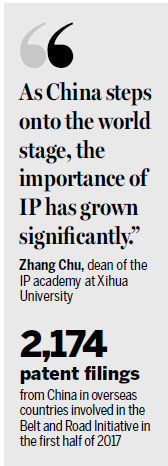Calls made to improve IP protection under B&R Initiative
China should improve intellectual property (IP) protection and risk controls under the Belt and Road Initiative, to help the international expansion of domestic companies, leading experts and officials believe.
"As China steps onto the world stage, the importance of IP has grown significantly," said Zhang Chu, dean of the IP academy at Xihua University in Chengdu, Sichuan province.

He was speaking recently at an IP-themed promotion activity held in the city.
IP needs synergistic mechanisms to ensure its all-round protection under the initiative, he said.
Sun Quanliang, an official from the Intellectual Property Development and Research Center of the State Intellectual Property Office, said countries and regions involved in the Belt and Road Initiative have different demands for IP due to their own development levels, and show quite different features in their patent applications.
By the end of 2016, there were 2.42 million patent applications from the countries and regions involved in the initiative. Most of the applications were from countries and regions with a sound industrial foundation, such as Russia and central and eastern Europe, and Southeast Asian countries with fast economic growth, Sun said.
Currently, most Chinese companies have inadequate IP protection and support in their overseas markets compared with those from developed countries such as the United States and Japan, he said.
"Enterprises and the country should undertake more analysis and plan the layout of IP in the early stages to ensure competitiveness with related markets," Sun said.
He called on Chinese companies to participate in the formation of industrial standards in overseas markets, and take the opportunity to improve their patent deployment and competitiveness.
He also suggested the government mainly focus on relevant IP rights through the implementation of policies, information exchanges, infrastructure upgrading, trade and risk assessment to build a new international IP order and new rules that meet the needs of companies with global development plans.
According to official statistics, in the first half of 2017 China submitted 2,174 patent applications in overseas markets involved in the Belt and Road Initiative, up 17.8 percent on the same period last year.
As the host province of the promotion activity, Sichuan is located at the junction of the Belt and Road Initiative and the Yangtze River Economic Belt and is the only pilot province for intellectual property in central and western China.
"We will come up with more solutions in the IP field in accordance with the Belt and Road Initiative," said Xie Shanghua, director of the Sichuan Intellectual Property Office.
The annual activity was initiated in 2014 by the State Intellectual Property Office, aiming to strengthen IP services and support local companies and industries to enhance IP rights awareness and protection.
Before Chengdu, the activity was held in Changsha, Dalian and Ningbo.